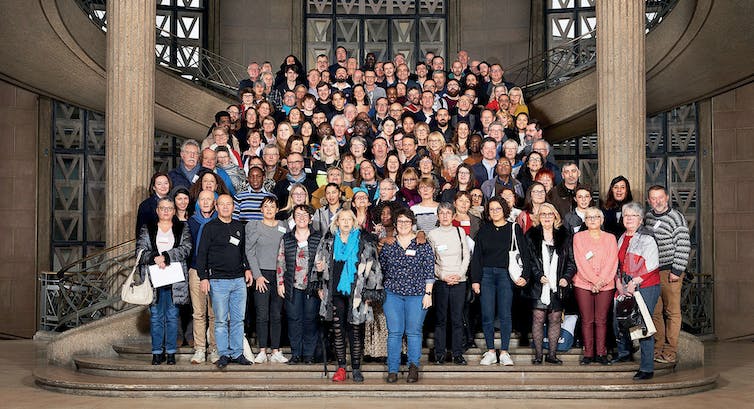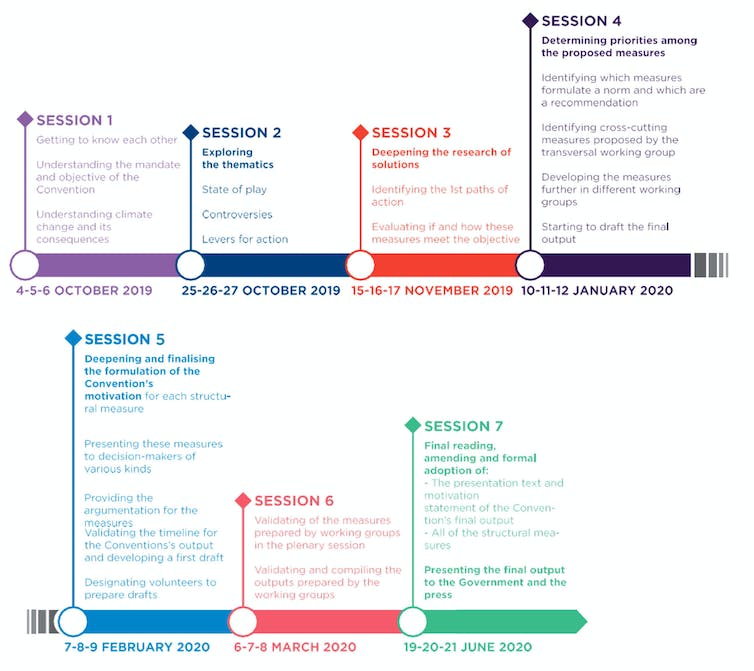France's Convention for the Climate, held from 2019 to 2020, introduced collectively 150 randomly chosen residents and requested them outline measures to cut back the nation's greenhouse fuel emissions by no less than 40% by 2030 in comparison with 1990. Katrin Baumann/CCC
There are a variety of how to create decision-making our bodies in democratic societies. Elections are one of the crucial widespread, with people stepping ahead and in search of public help. If elected by their fellow residents, they then take motion on their behalf. This is called consultant democracy. An various kind is direct democracy, which entails all residents voting on proposed authorities insurance policies or laws.
af
Another kind that’s rising in reputation are residents’ assemblies – decision-making our bodies created by random choice. While much less widespread, they’re creating a way of optimism about democracy amongst those that have heard about or taken half in them, in addition to organisations such because the OECD. Randomisation – also called sortition – holds out the chance that everybody can have an equal probability of being chosen; politically, it affords the hope of consensus as a result of partisan engagements usually are not a prerequisite for participation. Randomisation additionally guarantees an meeting the place range of expertise and opinions promotes essential reflection and reasoned judgement, as with felony juries.
Citizens’ assemblies could be requested to weigh in on main challenges to society – for instance, France’s Convention for the Climate and the UK’s Climate Assembly, each held from 2019-2020, introduced collectively a whole bunch of individuals collectively and requested them outline measures that can permit to cut back greenhouse fuel emissions in an equitable method. Other such our bodies included the Citizens’ Assembly on Brexit (2017) and Germany’s Citizens’ Assembly on Democracy. Ireland even has a standing Citizens’ Assembly, established in 2016.
Reflecting society as an entire
Creating a residents’ meeting that actually displays society as an entire isn’t so easy, nevertheless. In specific, solely a really small share of these invited to take part really agree to take action. According to a 2017 examine printed European Journal of Political Research, the exact share will depend on how massive, advanced and time-consuming the method is prone to be. It ranges from 4% for bigger, extra onerous assemblies to 30% in a few distinctive instances, and averaging out at 15% throughout all international locations and all types of meeting. As a consequence, the formal equality of alternative that unweighted lotteries promise tends to end in assemblies skewed to the socially advantaged, the partisan, and people most assured of their sensible and cognitive talents, regardless of the actuality.
To create an meeting that’s extra descriptively consultant of the inhabitants – or one that appears extra like us – a number of approaches are used. One is to have an preliminary part of unweighted choice adopted by a second part that makes use of weighted lotteries. Another is to make use of stratified sampling or types of stratification from the start.
For the Climate Assembly UK, organisers despatched out 20% of its 30,000 letters of invitation to folks randomly chosen from the lowest-income postcodes, after which used random stratified sampling by laptop to pick out 110 members from all of the individuals who had been over 16 and free on the related dates.
Because citizen assemblies are very small in comparison with the inhabitants as an entire – France’s Convention for the Climate was made up of simply 150 folks – the descriptively consultant character of the meeting can happen on only some dimensions. Organisers should subsequently resolve what inhabitants traits the meeting ought to embody and in what quantity. Randomisation thus doesn’t preclude troublesome ethical, political and scientific selections in regards to the meeting to be constructed, any greater than it precludes voluntariness or self-selection.

The Convention for the Climate was made up of 150 French residents from all walks of life.
Katrin Baumann/CCC
The use of weighted lotteries implies that people is not going to have a formally equal probability to be chosen to it – nor, after all, a substantively equal one. Assemblies created by stratified random choice provide a a lot wider set of alternatives to serve than is typical of different deliberative our bodies. It is thus vital to do not forget that even when a randomly chosen meeting “seems like us”, everybody is not going to have had the identical probability to be chosen to it, nor to take up the invitation in the event that they wish to.
Making the controversy actually open
The most egalitarian ingredient of citizen assemblies, then, might lie of their dedication to deliberative equality amongst members, reasonably than within the social profiles of their members. That dedication implies that organisers make sure that all members get to share the identical high-quality, neutral data. Otherwise, it will be troublesome for meeting members who’ve restricted data in regards to the subject of deliberation to debate as equals with those that are already nicely knowledgeable (or satisfied that they’re).
Assemblies additionally use facilitators to make sure that all members be at liberty to contribute, that some don’t dominate the dialogue or intimidate others, deliberately or in any other case. The significance of facilitation to good deliberation is introduced out by the expertise of 1 facilitator, who said “In each single residents’ jury we have now finished, we’ve been thrown out – and requested again in.”

France’s Convention for the Climate happened from October 2019 to June 2020, and concerned seven classes that helped construct understanding, outlined the challenges, and reached formal conclusions.
Convention for the Climate
While the significance of getting equality amongst members and between organisers, consultants and members shouldn’t be underestimated, democratic equality doesn’t require that deliberative our bodies be composed of social teams in proportion to their share of the inhabitants.
Trying to make sure that the membership of a small meeting matches that of the inhabitants alongside strains of intercourse, age, degree of schooling, skilled standing, geography, implies that it’s not possible to match them in different methods – for instance, when it comes to their completely different beliefs, or when it comes to the proportion of girls who’re farmers reasonably than financial institution managers. In quick, attempting to create a microcosm of the inhabitants alongside sure strains prevents the deliberative illustration of the inhabitants on others.
Giving the deprived an actual voice
As a consequence, political philosophers who’re involved with the sufficient illustration of deprived social teams usually suppose that what we must be aiming for ample illustration to make sure that their voices, opinions and inner variations are taken severely in public assemblies, reasonably than illustration in proportion to inhabitants. As Anne Phillips places it:
“The underlying preoccupation shouldn’t be with pictorial adequacy – does the legislature match as much as the folks? – however with these significantly pressing cases of political exclusion which a ‘fairer’ system of illustration seeks to resolve.”
For instance, the over-representation is prone to be vital for teams such because the homeless, the very poor, these with restricted schooling, or those that endure from continual sickness. They could also be comparatively small in comparison with the full inhabitants, however in addition they endure from extreme disadvantages that make it troublesome to take part in public deliberations, and to be heard and revered because the equal of others. For them, sufficient illustration will seemingly require membership that’s a lot larger than their share of the inhabitants.
In quick, such teams are prone to endure from “cultural imperialism”, as Iris Marion Young referred to as it. This implies that the creation of an meeting that “seems proper” is inadequate. Instead, types of meeting created particularly to maximise their alternatives to be heard could also be needed, even at the price of underrepresenting members from extra advantaged teams, comparable to university-educated middle-aged males, whose views are prone to determine disproportionately in public dialogue.
Consensus, however not at any worth
It may be fascinating to rethink the apply of getting a single report with coverage suggestions, reasonably than permitting for separate majority and minority experiences. Pressure to achieve consensus can impede deliberation, as appears to have occurred with France’s Convention for the Climate, and reinforce social and political inequalities. Understanding why residents disagree when confronted with the identical proof and arguments is, itself, a contribution to public data and reflection.
Seeking consensus is vital, as a result of residents must know what they will agree on in issues of public coverage. But deliberators might have vital disagreements to air publicly, and these shouldn’t be a supply of disgrace or embarrassment, nor seen as a menace to the success of an meeting, reasonably than as proof of the complexity of the problems with which it grappled. In quick, whereas educated moderators are important to citizen assemblies – and would possibly profitably be utilized in many different deliberative fora – securing the inclusion and variety that make citizen assemblies so interesting, requires confronting cultural imperialism extra explicitly in future.
![]()
Annabelle Lever a reçu des financements de EC Coordination and Support Grant: Reconstructing Democracy in Times of Crisis: A Voter-Centred Perspective (REDEM). Project 870996. Call H2020-SC6-GOVERNANCE-2019.
